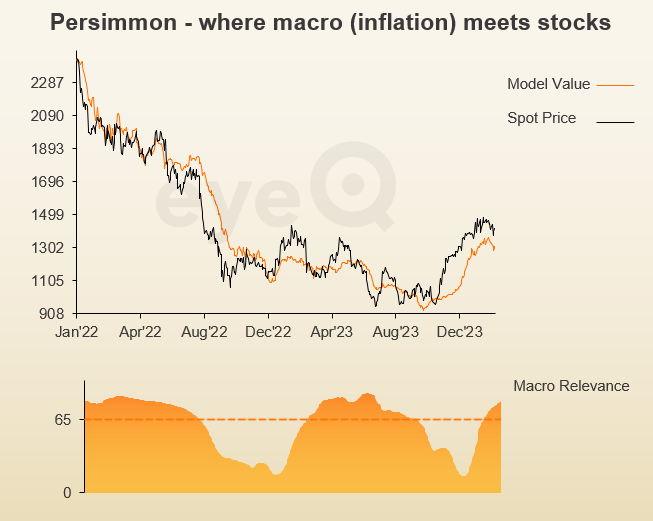eyeQ: are Persimmon shares vulnerable to macro shock?
interactive investor has teamed up with experts at eyeQ who use artificial intelligence and their own smart machine to generate actionable trading signals. High-flying Persimmon is under the microscope this time.
13th February 2024 10:23
by Huw Roberts from eyeQ

"Our signals are crafted through macro-valuation, trend analysis, and meticulous back-testing. This combination ensures a comprehensive evaluation of an asset's value, market conditions, and historical performance." eyeQ
Discover: eyeQ analysis explained | eyeQ: our smart machine in action | Glossary
Persimmon
Trading signal: long-term strategic
Model value: 1,283.78p
Fair Value Gap (premium/discount to Model Value): 8.9%
Model relevance: 82%
Data correct as at 13 February 2024. Please click glossary for explanation of terms.
A big macro week – Persimmon is where the big picture impacts stocks
There’s a whole raft of key economic reports out in the UK this week. And after the first this morning – the latest labour market statistics – the score is Bank of England 1, markets 0.
That’s because the pattern thus far in 2024 has been for markets to push for early and relatively aggressive rate cuts from the Bank of England to justify the rally in equities. But the Bank (plus the Federal Reserve and European Central Bank) has consistently argued that it’s too soon to declare a definitive victory over inflation and, as such, while rate cuts are coming, they will be measured.
This morning, UK wage growth slowed but not by as much as expected. As a result, markets have pared back expectations for Bank of England rate reductions.
The next most important release is inflation. If CPI again disappoints (and several economists think base effects and airfares will keep it elevated) then the story for UK equity markets will shift even further in the direction of sticky inflation restricting Bank rate cuts.
So, how can retail investors prepare themselves?
eyeQ’s smart machine has the ability to look at the UK equity market and screen all the stocks in the FTSE 350 for their sensitivity to UK inflation expectations. In effect, looking for those companies that will move the most if we get an inflation shock.
One of the most interesting is the homebuilder Persimmon (LSE:PSN) which is:
- Back being a macro play. At 82%, macro relevance is high, suggesting investors need to know the big picture
- Macro model value is rolling over – conditions are deteriorating
- The market is lagging the move which leaves Persimmon 8.9% rich on our model
- That is close to hitting our threshold for a bearish signal.
- The biggest driver of model value is inflation and the relationship is negative, i.e. the fall in inflation over late 2023 helped Persimmon rally, but any uptick in inflation expectations would hurt the share price.
The bottom line? If inflation data comes out stronger than expected this week, Persimmon which is already rich to macro conditions, looks especially vulnerable.
The early 2024 buzz has been about rate cuts helping the housing market recover. Investors reading such stories in mainstream financial media might be tempted to interpret that as meaning homebuilders are a buy.
Be careful. If the story flips from inflation falling back towards target, to inflation remaining stubbornly high, then investors need to be on guard. And that means knowing which stocks benefit, and which suffer under each scenario.

Useful terminology:
Model value
Where our smart machine calculates that any stock market index, singe stock or exchange-traded fund (ETF) should be priced (the fair value) given the overall macroeconomic environment.
Model (macro) relevance
How confident we are in the model value. The higher the number the better! Above 65% means the macro environment is critical, so any valuation signals carry strong weight. Below 65%, we deem that something other than macro is driving the price.
Fair Value Gap (FVG)
The difference between our model value (fair value) and where the price currently is. A positive Fair Value Gap means the security is above the model value, which we refer to as “rich”. A negative FVG means that it's cheap. The bigger the FVG, the bigger the dislocation and therefore a better entry level for trades.
Long Term model
The Long Term model looks at share prices over the last 12 months, captures the company’s relationship with growth, inflation, currency shifts, central bank policy etc and calculates our key results - model value, model relevance, Fair Value Gap.
These third-party research articles are provided by eyeQ (Quant Insight). interactive investor does not make any representation as to the completeness, accuracy or timeliness of the information provided, nor do we accept any liability for any losses, costs, liabilities or expenses that may arise directly or indirectly from your use of, or reliance on, the information (except where we have acted negligently, fraudulently or in wilful default in relation to the production or distribution of the information).
The value of your investments may go down as well as up. You may not get back all the money that you invest.
Equity research is provided for information purposes only. Neither eyeQ (Quant Insight) nor interactive investor have considered your personal circumstances, and the information provided should not be considered a personal recommendation. If you are in any doubt as to the action you should take, please consult an authorised financial adviser.
Disclosure
We use a combination of fundamental and technical analysis in forming our view as to the valuation and prospects of an investment. Where relevant we have set out those particular matters we think are important in the above article, but further detail can be found here.
Please note that our article on this investment should not be considered to be a regular publication.
Details of all recommendations issued by ii during the previous 12-month period can be found here.
ii adheres to a strict code of conduct. Contributors may hold shares or have other interests in companies included in these portfolios, which could create a conflict of interests. Contributors intending to write about any financial instruments in which they have an interest are required to disclose such interest to ii and in the article itself. ii will at all times consider whether such interest impairs the objectivity of the recommendation.
In addition, individuals involved in the production of investment articles are subject to a personal account dealing restriction, which prevents them from placing a transaction in the specified instrument(s) for a period before and for five working days after such publication. This is to avoid personal interests conflicting with the interests of the recipients of those investment articles.